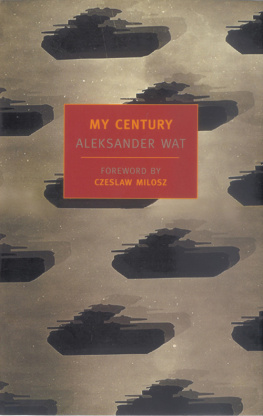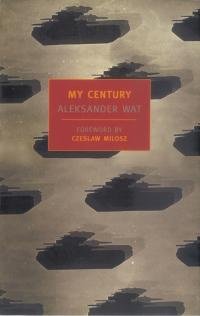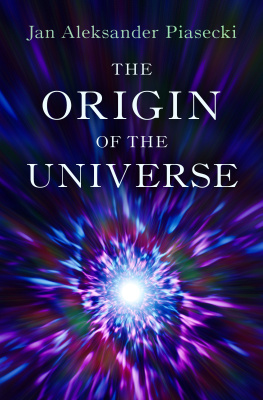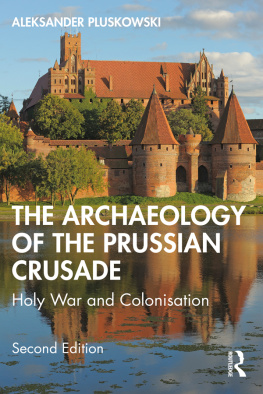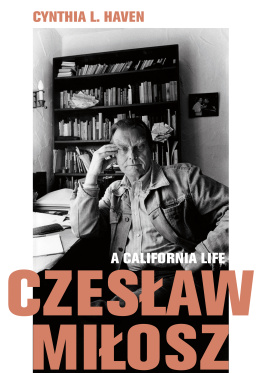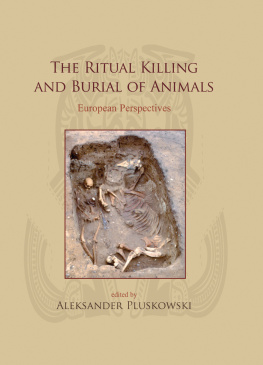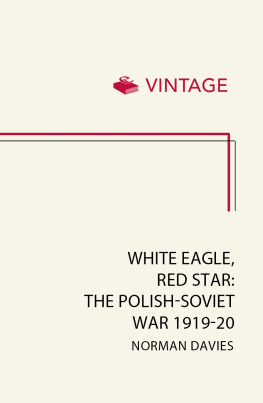
ALEKSANDER WAT (19001967), the nom de plume of Aleksander Chwat, was born in Warsaw, the descendant of an old and distinguished Jewish family which counted among its members the great sixteenth-century cabalist Isaac Luria. He attended Warsaw University, where he studied philosophy, psychology, and logic, and formed strong ties with the literary avant-garde, publishing a first book of poems, Me from One Side and Me from the Other Side of My Pug Iron Stove, in 1920 and, some years later, a collection of stories entitled Lucifer Unemployed. Wat edited a variety of influential journals and helped to disseminate the work of Mayakovsky and the futurists in Poland, before forming an allegiance with the Communist Party and confining his writing to journalism. In 1939 he fled east before the advancing German army and was separated from his wife and young son. The family reunited in Lww, then under Soviet control, where Wat found work on a newspaper, only to be placed under arrest. Imprisoned in the Soviet Union for the better part of two years, during which time he converted from Judaism to Christianity, Wat again rejoined his family, who had been exiled to Kazakhstan, in 1942. They returned after the war to Poland, where Wat began to write poetry again while serving as editor of the state publishing house. In 1963, he left his native country for France. Wat was invited in 1964 to the University of California, Berkeley, where he taped a series of conversations about his life and times with his countryman the poet Czeslaw Milosz. Edited by Milosz, these were published posthumously as My Century.
CZESLAW MILOSZ was born in Lithuania in 1911. Over the course of his long and prolific career he has published works in many genres, including criticism (The Captive Mind), fiction (The Issa Valley), memoir (Native Realm), and poetry (most recently New and Collected Poems, 19312001). He is a member of the American Academy and Institute of Arts and Letters and was awarded the Nobel Prize for Literature in 1980.
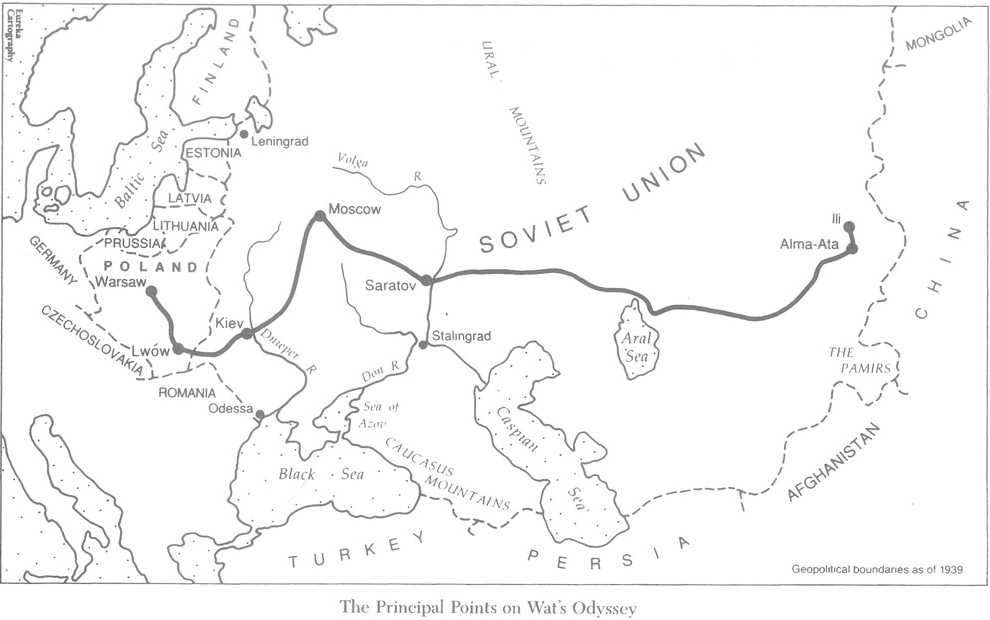
MY CENTURY
THE ODYSSEY OF A POLISH INTELLECTUAL
ALEKSANDER WAT
Edited and translated from the Polish by
RICHARD LOURIE
Foreword by
CZESLAW MILOSZ
NEW YORK REVIEW BOOKS

New York
JAPANESE ARCHERY
The hand tells the bowstring:
Obey me.
The bowstring answers the hand:
Draw Valiantly.
The bowstring tells the arrow:
O arrow, fly.
The arrow answers the bowstring:
Speed my flight.
The arrow tells the target:
Be my light.
The target answers the arrow:
Love me.
The target tells arrow, bowstring, hand and eye:
Ta twam asi.
Which means in a sacred tongue:
I am Thou.
(Footnote of a Christian:
O Mother of God,
watch over the target, the bow, the arrow
and the archer).
ALEKSANDER WAT
Translated by Richard Lourie
CONTENTS
CHRONOLOGY
| 1900 | Aleksander Wat is born in Warsaw, May 1, to a family of Polish-Jewish intelligentsia. |
| 1918 | Poland regains its independence. |
| 1919 | Wat studies philosophy at the University of Warsaw. He is a co-founder of the Polish futurist movement. |
| 1920 | Polish-Soviet war. Soviet army retreats in disarray after the Battle of Warsaw on August 16. Poland is ceded western Byelorussia and eastern Galicia by Treaty of Riga in 1921. Wat publishes Me from One Side and Me from the Other Side of My Pug Iron Stove, a collection of futurist poetry. |
| 1926 | Wats first trip to Paris. Pisudski assumes power through a coup. |
| 1927 | Wat marries Paulina (Ola). He publishes Lucifer Unemployed, a collection of experimental stories. Vladimir Mayakovskys first trip to Warsaw. |
| 1928 | With the idea of starting a magazine, Wat travels to Germany and France to make contacts. |
| 1929 | Wat begins as editor of The Literary Monthly, the most important communist magazine in Poland between the wars. |
| 1930 | Vladimir Mayakovsky commits suicide in Moscow. |
| 1931 | Andrzej Wat is born, son of Aleksander and Ola. |
| 1932 | The Literary Monthly is closed down by the authorities. Wat is imprisoned briefly, his first arrest. |
| 1933 | Hitler comes to power in Germany. |
| 19331939 | Wat works for Gebethner and Wolff publishing company. |
| 1938 | The Polish Communist party is dissolved. |
| 1939 | Molotov-Ribbentrop Pact, August 23. |
| 1939 | Germany attacks Poland on September 1. On September 6, Aleksander, Ola, and Andrzej Wat flee Warsaw. Traveling with relatives in two cars, the family is separated. As part of a secret understanding with Germany, the Soviet Union attacks Poland on September 17. Wat goes to Lww, works briefly for the Red Banner newspaper, continues to search for his wife and son. |
| 1940 | Wat is arrested by Soviet authorities in Lww, January 24. Ola and Andrzej are deported to Kazakhstan in Soviet Asia, April 13. In October, Wat is transferred to a prison in Kiev and then in late fall to Lubyanka in Moscow. |
| 1941 | Germany invades Russia, June 22. Lubyanka is evacuated. Wat is transferred to a prison in Saratov, where he undergoes a religious conversion to Christianity. In late 1941, Wat is released from prison. Polish government in London is now allied with the USSR. Wat travels to Alma-Ata, where he works for the Polish delegation as a school inspector. |
| 1942 | Wat is reunited with Ola and Andrzej in April. |
| 1943 | Stalin severs relations with the Polish government in April. Wat is deported with his family to Ili in Kazakhstan. In March, the NKVD attempts to force Poles to accept Soviet citizenship in the passportization campaign. Wat organizes resistance. Both he and Ola are imprisoned and eventually released. They retain Polish citizenship. |
| 19431946 | In Ili. |
| 1946 | The Wats return to Poland. |
| 19461949 | Wat is active in the literary world. |
| 19491956 | Wat is persecuted during the Stalinist era. |
| 1953 | Stalin dies. |
| 1956 | Khrushchevs secret speech. Gomuka comes to power in Poland. |
| 1957 | Wat publishes Poems, wins Nowa Kultura prize, is acclaimed by the young generation. |
| 1959 | The Wats assume permanent residence in Paris. |
| 1962 | Wat publishes Mediterranean Poems in Poland. He falls out of favor soon thereafter and is banned. |
| 19641965 | Wat in Berkeley. With Czeslaw Milosz, he tapes memoirs, published in 1977 in London under the title My Century. |
| 1967 | Aleksander Wat dies in Paris. |
| 1968 | Dark Trinket, poems 19631967, published in Polish in Paris. |
MY CENTURY
FOREWORD
My Century differs greatly from those books that usually bear the name Recollections or Memoirs. Because this book belongs to a separate literary genrethe tape-recorded conversationits value as a source of information about this century is arguably greater. Although the syntax has been smoothed and repetitions eliminated, the features of direct speech to a particular listener have been preserved. The speaker here emerges more actively and vigorously than do the authors of written memoirs, and he freely reveals the movement of his thought with its attendant multitude of associations.

